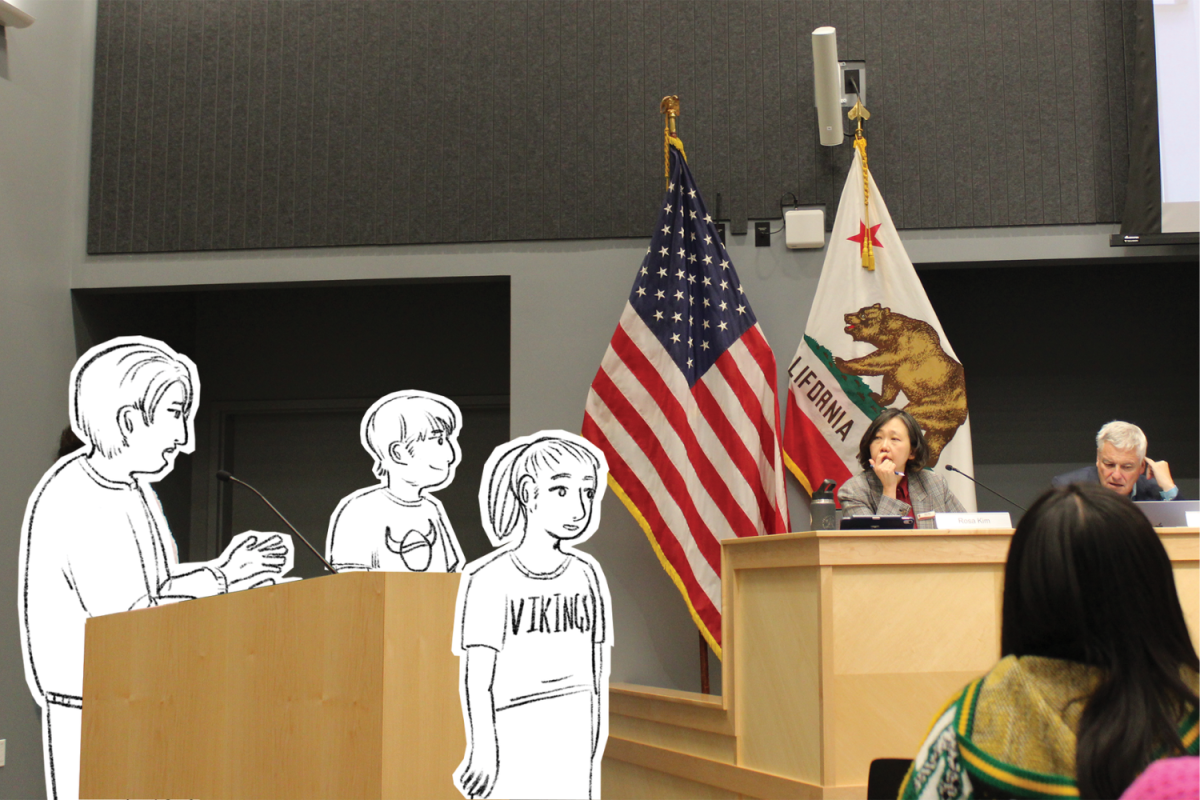From anti-waste measures in FUHSD food service to the district Climate Collective’s recycling initiative, numerous endeavors from FUHSD and student groups have made strides toward greener campuses in recent years. Nonetheless, progress requires more than one-sided action — students should also match existing efforts and maintain a higher degree of commitment to campus sustainability.
The district’s ongoing efforts have integrated sustainability into multiple aspects of campus, including many that often go unnoticed. Their commitment has earned them national recognition; in 2023, FUHSD received its first-ever U.S. Department of Education Green Ribbon School competition’s silver award for promoting green practices.
Their focus on energy conservation has led to a revamping of outdated energy-inefficient HVAC systems. Additional plans are also in place to install more charging stations for electric vehicles in parking lots, encouraging students and staff to drive EVs. Newly built and remodeled buildings will meet higher environmental standards, bolstered by measures such as rooftop solar panels and clerestory windows, which encourage the use of natural light.
Waste management is another major focus of the district, as arrangements for the installation of campus-wide compost bins are in the works. However, this is not a new area of attention; currently, all FUHSD schools use solely compostable materials in food service, even though they are generally more expensive and less readily available than their standard counterparts.
Since 2020, cafeteria staff have made weekly or biweekly donations of all leftover food to the Peninsula Food Runners, a local nonprofit organization that distributes the food to various groups in need — a testament to the district’s unique use of sustainability to benefit not only the environment but also local communities.
“I keep an average of how many students come in on different days because every day is different,” food service manager Tom Fernandez said. “Ideally, we’ll run out of all the food that we need to produce, then we’ll have backups. I try to cut the number of servings as close as possible to the number that we expect.”
Many student-based district and school-wide groups are also taking action. The FUHSD Climate Collective, formed in 2020, launched a student-led Paper Recycling Initiative across FUHSD classrooms and the first-ever FUHSD Earth Day event on April 11, which sought to educate students on the importance of environmental awareness. Along the same lines, the Conservation Action Association has hosted an Earth Day Festival in 2023 and its second Walk or Bike to School Day on April 24.
“I think that just spreading awareness in school is one huge step toward promoting more sustainable practices in classrooms and within our community,” junior and CAA officer Medha Nalakonda said.
CAA’s Earth Day Festival was planned with support from the ASB Sustainability Commission, which was formed in November 2022. As a whole, ASB has also made efforts to mitigate waste by hosting two balloon-free rallies and scaling down large posters. ASB plans to expand further next year by experimenting with water dispensers in place of miniature plastic water bottles at events. Their actions prove that it is possible to make changes for sustainability without disrupting existing norms and expectations.
“We don’t want students to miss out on the Lynbrook experience, but it’s also about how much we can actually sacrifice for the greater good of the environment,” sophomore and ASB Sustainability Commission member Shreya Somani said. “We’re trying to find a good balance.”
Despite administrative efforts like food share bins in the cafeteria, food waste and litter continue to plague Lynbrook’s campus today. Half-eaten lunches and untouched fruit remain a common sight.
“We could be making a huge impact in the little choices we make every single day by putting organics in the compost instead of the landfill,” Miller Middle School teacher and campus sustainability leader Ana Reed said.
The issue of recycling contamination also remains. When students mistakenly place food and drinks into recycling bins or throw recyclable items into trash cans headed for landfills, they contribute to waste and pollution.
“I do see some laziness when it comes to reducing waste in general,” junior Jackson Qu said. “All suggestions are useless unless students actually try to commit to them.”
Lynbrook has installed both blue recycling bins and black landfill bins on campus, and the Climate Collective has placed labels above many classroom recycling bins that list which materials do and do not belong. Even so, plastic water bottles and paper plates are a common sight across campus. This is a result of often subconscious decisions by the student body that can be easily revised.
“There needs to be students involved in helping come up with what sustainability will look like on our campus because the students know how they act,” Assistant Principal Tara Grande said.
Becoming environmentally literate allows students to consistently make educated, environmentally conscious decisions in their day-to-day lives. Environmental literacy entails understanding the reasoning and methods behind the push for sustainability; it includes staying informed on local progress.
“There’s minimal education about the depth of the issue as well as the solutions students can get involved in,” junior, and CAA and Climate Collective member Daphne Zhu said. “Increasing environmental literacy, which can translate into environmental action, is very important.”
Sustainability may seem like a burdensome afterthought that pales in importance and achievability to other issues and responsibilities. However, minor decisions and habits in favor of sustainability can be easily implemented; the consequences of negligence are much harder to reverse. Simple actions such as utilizing natural light to conserve energy, turning off the air conditioning when possible and walking, biking or carpooling greatly benefit the environment.
“It’s those little things that all add up,” Miller social studies teacher and campus sustainability leader Nicole Gasparik said. “We need to take personal responsibility; we can feel empowered that our choices make a difference to our community and our world.”
Measures taken by the administration and student groups prove that significant strides toward sustainability are well within reach. However, their efficacy is severely limited by the general student body’s lack of awareness and interest. Active participation from all sides is crucial to progress. Students should be supportive of continuous efforts from the administration and student groups, while also taking personal initiative by adjusting their mindsets and habits.
“We have had notable achievements as a district, such as receiving the GRS Silver award last year,” Zhu said. “We should acknowledge what we’ve accomplished, but there’s still so much more that we can do.”

































































